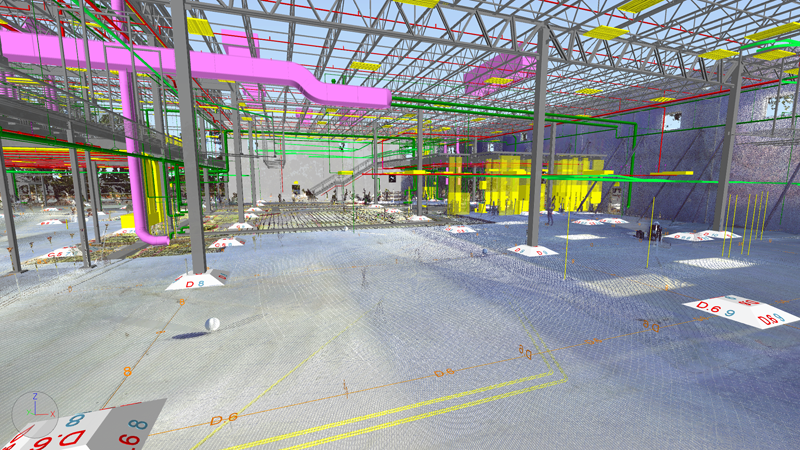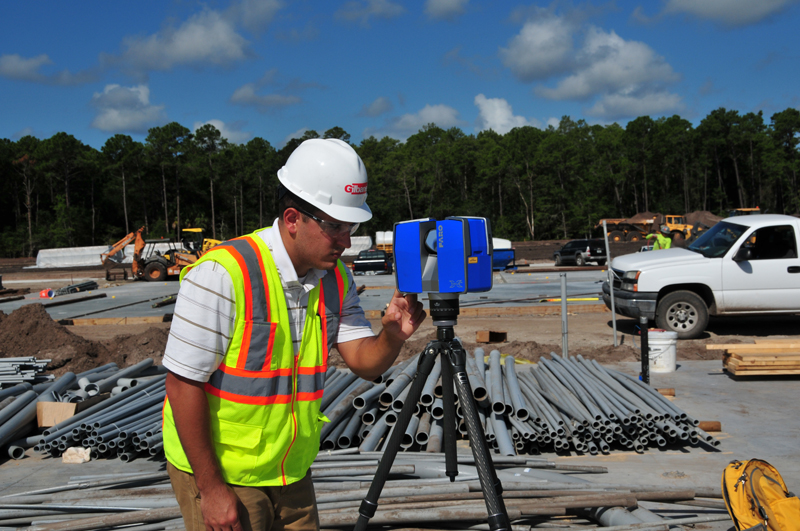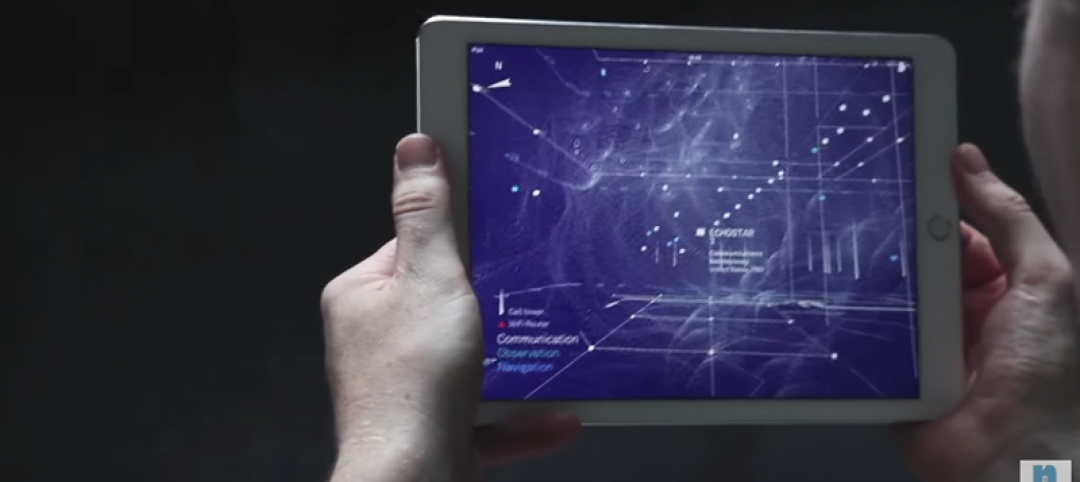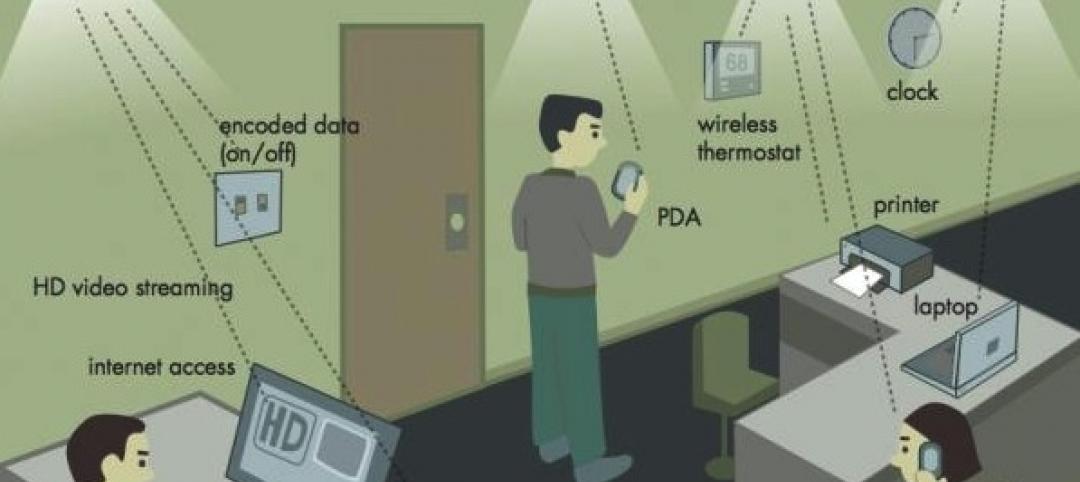Trust but verify. It’s a time-honored treaty enforcement principle. It also works well as a basic mantra for BIM (building information modeling)-based building construction. Just ask the Virtual Design & Construction (VDC) Team at Gilbane, a family-owned and operated construction company. Armed with a phase-shift laser scanner, a Gilbane VDC engineering team recently documented measurement discrepancies on a high-profile building construction project.
Gilbane specializes in the high-wire world of at-risk construction. On occasion, Gilbane is called in to rescue troubled projects. Recently the Gilbane VDC team was summoned to do just that. John Tocci, Jr., Director of the VDC Team sets the stage: “The work involves a new corporate campus, the headquarters of a Fortune 500 company. For various reasons, the previous construction manager was terminated. That happened on a Friday. My team took over the job on Saturday. By Sunday afternoon we were laser scanning part of the project in order to reconcile measurements for Monday morning meetings.”
Trade contractors desperately needed reliable benchmarks to accurately set walls, ducts, pipe, conduit locations, and other assemblies. Then there was the elevator shaft. Laser scanning verified two-inch variations on all sides, with the elevator opening three inches smaller than it should be. There was a new sheriff in town and the trades eventually rallied to the Gilbane VDC team.

A point cloud of modeled as-built conditions.
“We’ve had a number of cases where the field team, trade contractors, or architects have argued with us about dimensions of existing conditions, Tocci stated. “We’ve been right every time. It underscores the fact that BIM and VDC, no matter how established we think it is, is still an emerging technology.”
As Gilbane discovered the anecdotal side of laser scanning pales in comparison to the dramatic ROI story. “Our first laser scanner paid for itself in the first week of operation,” Tocci reports. “We conservatively calculate we saved about $150,000 on the first project we scanned.” Just one week? Understandably, that kind of near-instant payback may strike some as too good to be true. Believe it, says Tocci. “If anyone wants to reverse engineer the calculations, they’ll quickly see the payback was actually quite larger,” Tocci reports.
“We assigned super-conservative values to all the ordinary construction tasks that scanning eliminates. We factor-in the electrical, mechanical, and plumbing packages on the job. “One week understates it. With scanning, there are no back charges. No finger pointing. No remediation. It’s all because it was measured right the first time,” Tocci says.
Like many risk-adverse businesses, Gilbane takes a careful, deliberate path to integrating new technology into their business. “The Focus3D Laser Scanner changed the industry,” Tocci declares. “When it came out it was three times less expensive than its competitors. Instead of capturing a single point at once, it can capture 978 million points per second. That’s a radically different scenario. It’s so easy for one person to move it around. It captures levels of detail that you didn’t think it could. “It’s an amazing tool. We now verify and find discrepancies that might bite us later on. All that risk goes away. We couldn’t be happier or more impressed,” Tocci says.
More Information:
FARO Technologies
250 Technology Park
Lake Mary, FL 32746
Phone: 407-333-9911 | Fax: 407-333-4181
aec.faro.com
Related Stories
BIM and Information Technology | Dec 21, 2015
Laser scanning and in-shop prefabrication a boon for the WellStar Paulding Hospital
Contractor Brasfield & Gorrie’s use of BIM and prefabrication on the Hiram, Ga., hospital shows how digital tools can lead to savings, safety, and better construction.
Sponsored | BIM and Information Technology | Dec 17, 2015
How is the Value of VDC for Design Management Translating Outside the US?
Sascha Vesterlund, a VDC Specialist, Design Processer with MT Højgaard, and Nathan Wood, Innovation at DPR Construction, shared their perspectives on VDC
BIM and Information Technology | Dec 3, 2015
New app visualizes cellular and Wi-Fi signals in an area
Using data collected from millions of cell towers and Wi-Fi routers, the app makes the invisible visible.
BIM and Information Technology | Nov 30, 2015
Light-based wireless technology is 100 times faster than Wi-Fi
Li-Fi, which reaches speeds of 224 gigabits per second, is being tested in Estonia.
Sponsored | BIM and Information Technology | Nov 25, 2015
Contractor leverages dynamic site logistic plan as BIM deliverable
I recently sat down with two Architects-Turned-VDC-Process-Managers to discuss the ways in which they are leveraging technology to bring the value of BIM downstream
BIM and Information Technology | Nov 24, 2015
Solving the data conundrum with better tools to capture, share, and analyze information
At a recent Thornton Tomasetti symposium, experts showed how designs and projects can be improved by granular information that’s accessible to more users.
Modular Building | Nov 19, 2015
AECOM and Project Frog form partnership for building modular data centers
The Rapid Deployment Team will provide solutions for data centers both small (1 MW) and large (50+ MW).
BIM and Information Technology | Nov 18, 2015
AIA: Energy modeling key to reaching carbon neutrality in buildings
Energy modeling allows architects to be more ambitious with energy-saving in their design projects.
Green | Nov 17, 2015
DOE launches new data collaborative to help cities and states boost building efficiency
The SEED Standard will help manage, standardize, share performance data.
Sponsored | BIM and Information Technology | Nov 12, 2015
Is the PDF revolution advancing BIM workflows?
Many project teams who struggle to get everyone up to speed with BIM, find PDFs a useful tool to bridge the gap between the BIM world and the paper world














